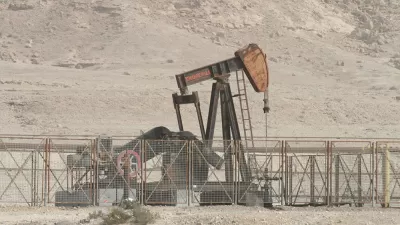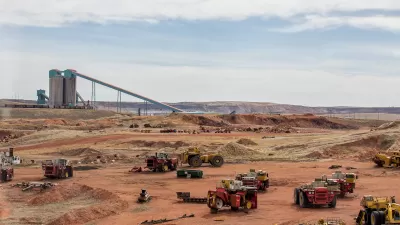The Trump administration's "energy dominance" agenda depends, in part, on growing the energy distribution network, namely pipelines, rail facilities, and ports. However, states can use the Clean Water Act to block pipelines and coal terminals.

"President Trump signed a pair of executive orders Wednesday that aim to speed approval and construction of fossil fuel projects, including the long-delayed Keystone XL pipeline, by limiting environmental reviews," reports Nicholas Kusnetz for InsideClimate News on April 11. The two orders are largely meant to expand the pipeline network needed to increase the domestic production and export of fossil fuels, part of an agenda the president calls "energy dominance."
The executive order, "Promoting Energy Infrastructure and Economic Growth," targets the Clean Water Act, specifically Section 401, "which gives states authority to authorize projects that have the potential to harm water quality," adds Kusnetz.
Supporters of more fossil fuel development have taken aim at this part of the law, arguing that states and environmental groups have used it inappropriately to delay or reject projects.
Three fossil fuel projects that have been either killed or delayed by states cited in the extensive article include:
- The Constitution Pipeline which would transport Marcellus Shale natural gas from Susquehanna County, Pennsylvania to Schoharie County, New York. [See related post].
- Washington State's denial of a water quality permit to build North America’s largest coal export terminal in Longview, Wash., although the U.S. Army Corps of Engineers has since revived that project. [Related post.].
- Oregon: The Jordan Cove Project which would export liquefied natural gas (LNG). " After conducting a preliminary review of the 401 Water Quality Certification application, the [Oregon Department of Environmental Quality] requested more information from the applicant," according to a DEQ update last December. [Related posts.].
As a result of the order, U.S. Environmental Protection Agency "Administrator Andrew Wheeler said his agency will 'soon' unveil a proposal for reining in states' ability to block energy infrastructure projects using their Clean Water Act authority," reports Kelsey Tamborrino reporter for POLITICO Morning Energy.
Among those expressing opposition to the executive order and the intent to fight it are the Sierra Club and Rep. Frank Pallone, Jr. (D-N.J.), chairman of the House Energy and Commerce Committee, while the "Western Governors' Association, whose members include the Republican governors of the nation's top energy-producing states, also questioned the move to limit states' authority," adds Kusnetz.
It issued a statement saying the governors "have concerns" about the order but are ready to work with federal officials on the new guidelines.
The second executive order, "Transportation Crossings at the International Boundaries," "appears to target the Keystone XL pipeline in particular, declaring that the decision to permit infrastructure crossing international borders 'shall be made solely by the President' rather than the State Department, to which previous administrations had delegated the authority," reports Kusnetz. Last November, a federal judge in Montana halted construction of the pipeline.
Trump issued exactly such a permit in March for Keystone XL, and both the permit and the new order appear to be attempts to sidestep a legal challenge.
Critically, having the president issue the permit directly, rather than going through the State Department, could make it more difficult for environmental and indigenous groups to challenge cross-border permits under the National Environmental Policy Act, which subjects major federal agency actions to careful review.
According to Joshua Galperin, an expert in environmental law at the University of Pittsburgh School of Law, the strategy may just work. On April 8, Calgary-based TransCanada Corp., "the company behind the pipeline, filed a motion seeking to have the case dismissed and the injunction lifted," adds Kusnetz. "The company asserted that the arguments against the original permit are moot now."
Expect more lawsuits, added Galperin.
FULL STORY: Trump Aims to Speed Pipeline Projects by Limiting State Environmental Reviews

Maui's Vacation Rental Debate Turns Ugly
Verbal attacks, misinformation campaigns and fistfights plague a high-stakes debate to convert thousands of vacation rentals into long-term housing.

Planetizen Federal Action Tracker
A weekly monitor of how Trump’s orders and actions are impacting planners and planning in America.

In Urban Planning, AI Prompting Could be the New Design Thinking
Creativity has long been key to great urban design. What if we see AI as our new creative partner?

Florida Seniors Face Rising Homelessness Risk
High housing costs are pushing more seniors, many of them on a fixed income, into homelessness.

Massachusetts Budget Helps Close MBTA Budget Gap
The budget signed by Gov. Maura Healey includes $470 million in MBTA funding for the next fiscal year.

Milwaukee Launches Vision Zero Plan
Seven years after the city signed its Complete Streets Policy, the city is doubling down on its efforts to eliminate traffic deaths.
Urban Design for Planners 1: Software Tools
This six-course series explores essential urban design concepts using open source software and equips planners with the tools they need to participate fully in the urban design process.
Planning for Universal Design
Learn the tools for implementing Universal Design in planning regulations.
Gallatin County Department of Planning & Community Development
Heyer Gruel & Associates PA
JM Goldson LLC
City of Camden Redevelopment Agency
City of Astoria
Transportation Research & Education Center (TREC) at Portland State University
Jefferson Parish Government
Camden Redevelopment Agency
City of Claremont




























